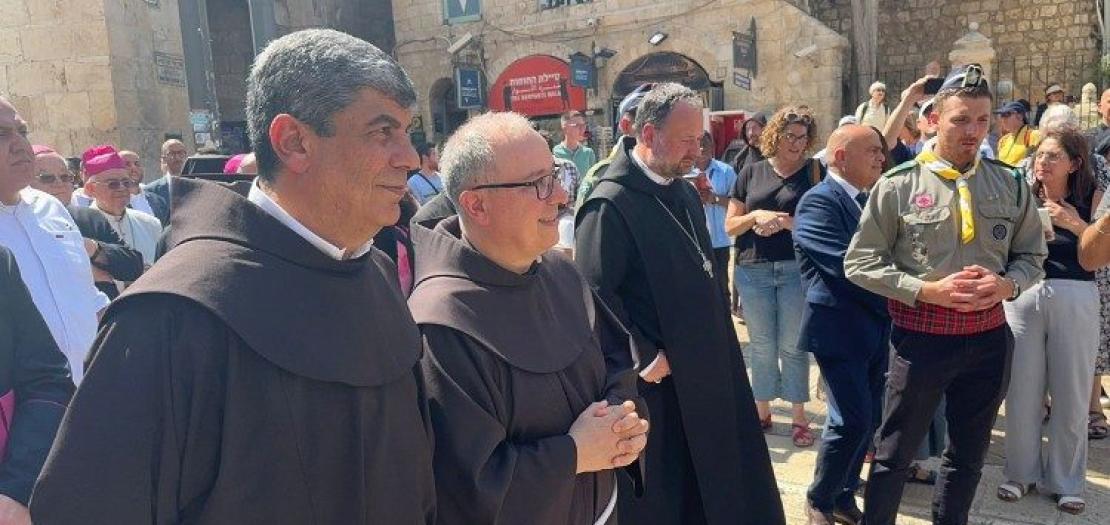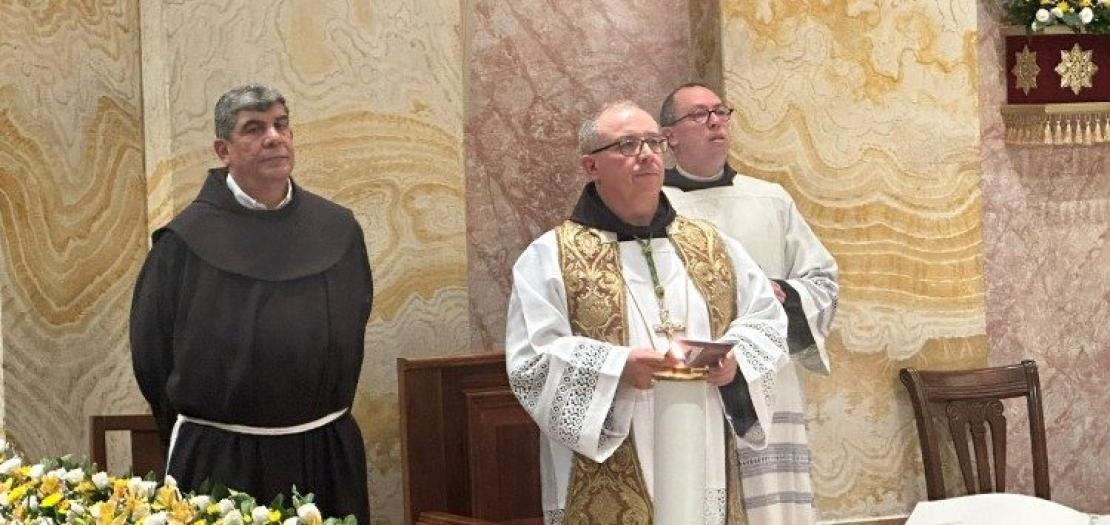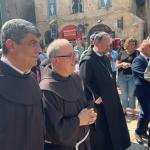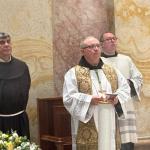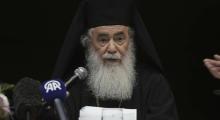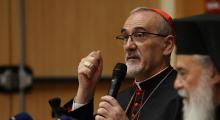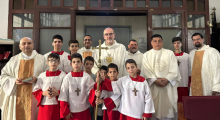Issued by the Catholic Center for Studies and Media - Jordan. Editor-in-chief Fr. Rif'at Bader - موقع أبونا abouna.org
On the Monday afternoon of 21 July the new Custodian of the Holy Land, Father Francesco Ielpo, made his solemn entrance into the Church of Saint Saviour in Jerusalem—an event that, together with the handing over of the seal by the outgoing Custodian, Father Francesco Patton, marks the official beginning of his mission in the Holy Land.
Interview with Fr. Francesco Ielpo
Father Ielpo, you begin your custodial mandate at perhaps the most difficult time this land has experienced since the war of 1967, if not since 1948. In Gaza, 57,000 people have died over the past 22 months, and the much-announced ceasefires have yet to materialize. In the West Bank, settler attacks are becoming more frequent and violent. Even the Christian minority is suffering repeated violence—as seen in the incursions by settlers into the Christian village of Taibeh and, most notably, last Thursday’s shelling of the Catholic parish in Gaza, which left three dead and ten injured.
Yes, I’m well aware that this is a very difficult time, especially because, as is well known, ours is not merely a custodianship of sacred places, but a living pastoral presence alongside the Christians of this land. And beyond the objective challenges, there are also subjective ones. I am very aware of the gap between the role entrusted to me and my personal limitations. But I also see this gap as an opportunity—in the sense that it allows more space for the action of the Holy Spirit. And I place my trust above all in that. Because it is thanks especially to the Spirit’s action that the Franciscans have managed, for 800 years and through many adversities, to witness to the Christian presence in the land of Jesus.
Father Ielpo, you are already very familiar with the Holy Land and the Custody. In recent years, you've also represented the Custody in Italy as the delegate of the Custodian. Do you already have a work plan in mind?
I intend to simply follow the path clearly marked by my predecessors. The Custody is not the Custodian—it is the dedication, effort, and talents of the more than 300 friars who compose and live it. More than directing, the Custodian's role is to bring out the best in these widely shared talents within this special Franciscan province. As Father Patton did very well over the past nine years.
Among these talents, I would highlight first the international nature of the Custody, which includes more than fifty different nationalities. My task is to harmonize this symphony of vocations and talents. Then, I would point to the distinctly missionary spirit of the Franciscans, rooted entirely in the following of Christ through evangelization. Here, that finds expression not only in welcoming countless pilgrims but also in running the parishes entrusted to us by the Latin Patriarchate of Jerusalem (including those in Jerusalem, Bethlehem, Nazareth, and Jaffa), and especially in the operation of 17 schools in Israel and Palestine that educate thousands of students in peace every year. These schools are without a doubt the added value of our pastoral work. And then there are the Christian charitable works, aimed at alleviating the suffering of the most vulnerable Palestinian populations. All of us are committed to this area, and in particular, Father Ibrahim Faltas has launched very important initiatives for children during these months of war.
Even before my official installation with today’s entrance, I wanted to begin my mission by visiting our communities in Syria and Lebanon in recent days. I was pleasantly surprised by the Christian spirit and effective work of our friars—and even more by the deep roots and appreciation they enjoy among the local populations of their mission territories. And not just among Christians.
In Syria, the friars also accompanied me to meet the Vicar of the Orthodox Patriarchate, and then the pastor of Saint Elias Church in the Dwelah neighborhood of Damascus. On June 21, that church was the target of a terrorist attack by Islamist extremists that killed more than 30 Christians and wounded over 60. The pastor told me about the attack and about his parishioners who were killed: the young girl, the first victim, who was shot on the church steps while coming to Mass with a candle in her hand; and the young man who threw himself at the suicide bomber just before the explosion, stopping him from reaching the pews full of worshippers—sacrificing himself to save dozens of lives.
At the end of our conversation, we exchanged a strong and heartfelt embrace—a sign of real ecumenism in shared suffering, under the same cross.
Then, when our friars organized a special Mass for my visit, I thought fear would keep people away. But instead, the church was full. Christian identity rises above ethnic or political identities.
In Lebanon, too, I witnessed the great charitable work of our friars during the Israeli bombings. They provided shelter to many displaced families both in Beirut and in the south. I am deeply moved by the courage and missionary spirit of our friars, which is so little known in the West.
What will you ask of your friars?
Simply, that they be good friars, as their predecessors were—those who have preserved and ensured the Christian presence in the Holy Land for 800 years. With care for their neighbor, but always with their gaze fixed on Christ.
During these days and this journey, I have reflected a lot on this new and undeserved assignment, inspired by a passage from the Gospel that has stayed with me. Today, as in Jesus’ time, the waves of the sea are high and threatening, and fear in the boat is great. But when the disciples see Jesus walking on the water, their fears subside. Peter tries to follow Him but begins to sink. Why? because he stopped looking into Jesus’ eyes.
That, to me, is the key. And it is both my personal goal and the proposal I make to our friars: to remain steady and unafraid in the storms of this world, by keeping our eyes fixed on Jesus.


